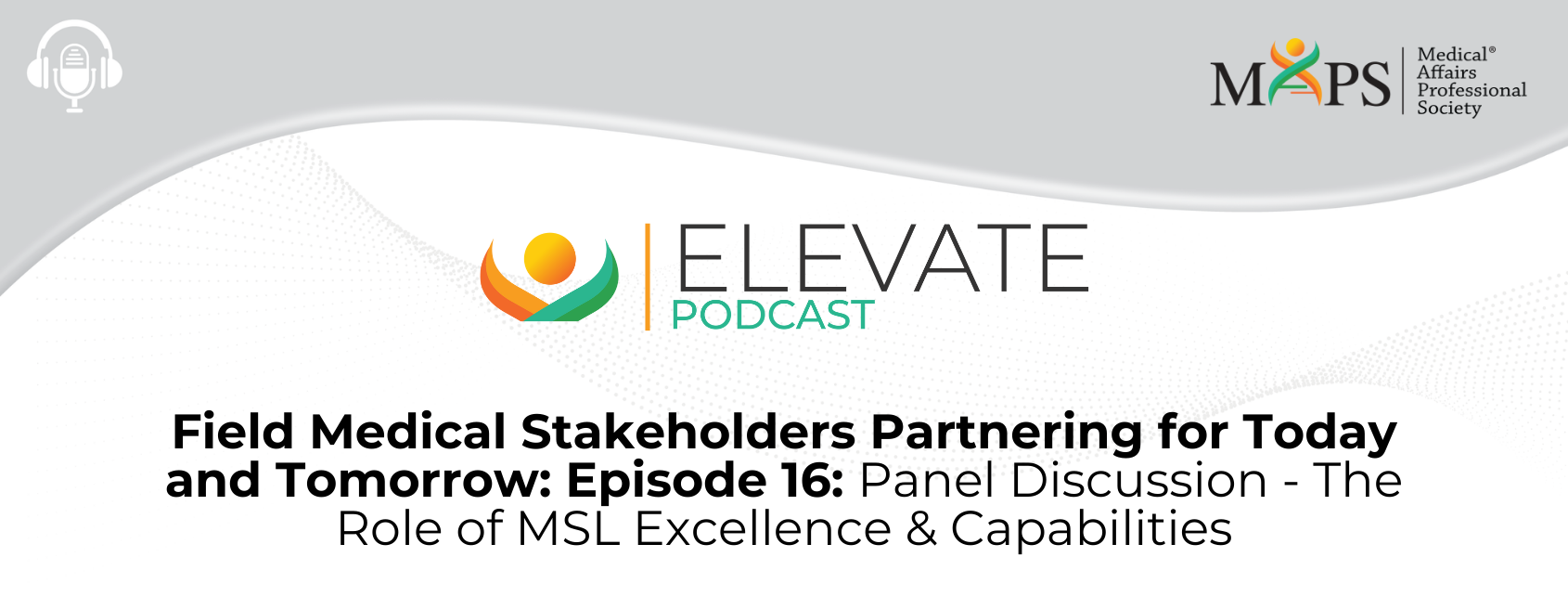Field Medical Stakeholders Partnering for Today and Tomorrow Episode 16 Panel Discussion: The Role of MSL Excellence & Capabilities
Objectives:
At the end of this series of podcasts, the participant should be able to:
· Discuss the functions and activities of key internal partners
· Identify potential areas for compliant collaboration by MSLs with key internal partners
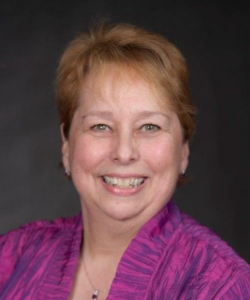
MODERATOR: Kathryn Gann, PhD
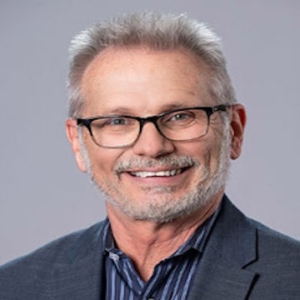
INTERVIEWER: Ralph Rewers
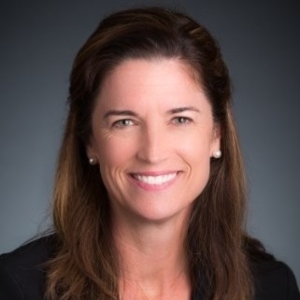
Panelist 1: Wendy Fraser, PhD
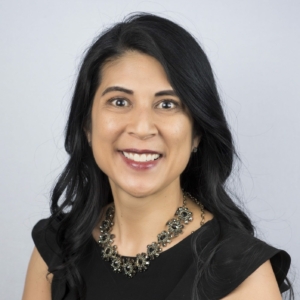
Panelist 2: Donna Holder, PharmD

Panelist 2: Eleonora Goldberg, PhD
Following is an automated transcription provided by otter.ai. Please excuse inaccuracies.
Kathryn Gann
Welcome to the Medical Affairs Professional Society’s Field Medical Focus Area Working Group’s podcast series, entitled “Field Medical Stakeholders: Partnering for today and tomorrow.” In this 16th podcast, we will be discussing MSL excellence and capabilities. I’m Kathyrn Gann. I’m a member of the Field Medical Focus Area Working Group, and I’ll be the moderator for this podcast. Currently, I’m an independent consultant in Medical Affairs, having spent my 30 year career as an MSL and MSL manager and an MSL trainer.
Our legal disclaimer is as follows: The views expressed in this recording are those of the individuals and do not necessarily reflect on the opinions of MAPS, or the companies with which they are affiliated. This presentation is for informational purposes only and is not intended as legal or regulatory advice.
We encourage you to engage in conversations about partnering with Field Medical stakeholders with other MAPS members via the community portal on the MAPS website. Simply log in with the email address and password associated with your MAPS account and click on the discussion tab. Then scroll down to field medical to post a question or review previous postings.
The objectives for this series of podcasts are that at the end of this series, the participant will be able to one discuss the functions and activities of key internal stakeholders and to identify potential areas for compliant collaboration by MSL with those key internal stakeholders.
This is a special edition of our podcast as today we have four global leaders and MSL excellent sharing their subject matter expertise with the MAPS membership. All of them are members of the Field Medical Focus Area Working Group, and all of them have participated in previous podcasts in this series. Our guests are Ralph Rewers, Senior Director of Global field medical excellence at AbbVie. And Ralph’s going to be our facilitator. Our panelists are Wendy Fraser, Executive Director, Global Field Medical Center of Excellence and Scientific Training, Global Medical and Scientific Affairs at Merck, and Eleanor Goldberg, Director, Global Field Medical Capabilities at Amgen, and Donna Holder, Senior Director, Global MSL Excellence, Oncology, Global Medical Affairs at Daiichi-Sankyo. Ralph, let me turn this over to you at this point.
Ralph Rewers
Thanks, Kathy. Appreciate it. It’s a pleasure to serve as the interviewer for the MSL excellence role. Just a little bit about my background. I’ve been in industry for about 27 years, in fact, starting my 28th year this month. I’ve worked specifically in the MSL role at for large pharma companies, Pfizer, Amgen, Bristol Myers Squibb and I have had previous experience in this role. So I’ll try to add to the discussion as well. I was the head of the MSL Excellence Team at AbbVie and I started that function a couple of years ago. Before we get started, I’d like each of you to give a quick career highlight and what led you to a role in MSL excellence. So Eleanora, let’s start with you.
Eleanora Goldberg
Thanks, Ralph. Hi, everyone. My name is Eleanora Goldberg. I started my career after my PhD trying to find a way into industry and found the MSL role, which I think is one of the best roles out there. I did that for quite a few years before deciding to move in house. I’ve been in house for about 10 years now in different areas within Medical Communications, and Medical Affairs as a whole. I spent a few years in the Intercontinental region where we identified this need for this medical capabilities role. And the past two years I’ve been within the global organization in the medical capabilities role. With that, I’ll hand it over to Donna.
Donna Holder
Thanks, Eleonora. I’m a PharmD and I’ve been in the industry almost 30 years. I’ve had roles in both clinical development and commercial, but the majority of my experience is Medical Affairs. The majority of that time has been in leadership roles for Field Medical. In 2012 I was at AstraZeneca and at that time, we were, as you say going global. We created the Global Medical Capabilities Organization and I took on the role for leading global MSL excellence. That was my first experience in this role. After I left AstraZeneca I spent a couple years consulting and then went to Merck, where I took on the role also to build out the Field Medical Center of Excellence. Last year I moved to Daiichi-Sankyo to do the same thing: to build out Global MSL Excellence function in our new oncology business unit. And with that, I’ll turn it over to Wendy.
Wendy Fraser
Thank you, Donna. My name is Wendy Fraser. I have my PhD and have been in the industry for 22 years, all of that time, at Merck. Here at Merck, I have had field roles. I’ve had a field management role. And then came into headquarters in the last three years, really to focus on what I’ve found to be my passion, which is Field Medical Excellence. So Ralph, I hope that that provides background on how we came into the roles we’re in today.
Ralph Rewers
Thanks, Wendy, appreciate it. As you see, our panel has a tremendous amount of experience in the industry, in Field Medical, and also to this Medical Excellence role. Really the role emerged across industry a little less than 10 years ago. So it’s a fairly new function within Field Medical. The understanding I have of the role is that the Field Excellence team sets out to ensure some consistency for the Field Medical function across the globe. And with the global function having different responsibilities, it’s a very interesting role. The first question is: Can you explain what Medical MSL Excellence means in your organization? Anything different from what I described? Donna, I’ll start with you.
Donna Holder
Thanks, Ralph. I’ll tell you, when I first got into this role back in 2012, I actually googled what a Center of Excellence was. I wanted to make sure I did it right. And I found that a Center of Excellence provides leadership, best practices, research, support and training for a focus area. That’s exactly what I feel a Center of Excellence does. And having an MSL Excellence Center that is solely focused on working with the MSL and leadership around the world to uplift that the MSL capability, and have it done well, as you said, we will create efficiency, promote consistency, and also drive innovation.
Ralph Rewers
Thanks, Donna, I really appreciate that. As you might imagine, you can do a number of things in this role to start out with, but you have to start somewhere first. So, Wendy, my question to you is, what did you decide to tackle first?
Wendy Fraser
Thanks, Ralph. I’d like to really leap off of some comments that Donna made in general with regard to consistency, not for the sake of consistency, but rather for both efficiency and effectiveness, as well as the ability to innovate. And with that in mind, we first tackled our MSL manager community. We felt as though just from an impact standpoint, to integrate into the system at the management level for field, we had the best ability to have impact on the overall field group. We also felt that from some of the comments that have been made about global organizations, from a numbers standpoint, to focus first, on the MSL manager community was manageable. It allowed us to have a number that we can bring together as a community, as Donna has mentioned, to best practice share, which as those numbers get larger and larger, just becomes more complicated. And we felt like by approaching the MSL manager community first, that was the most manageable way to go forward. We also focused a lot on MSL manager. I won’t add to that, but what I will add is one of the first things we did is a global awards and recognition program. And this was during the pandemic. We really questioned whether it was the right time to do it and decided absolutely, with everything that was happening. We wanted to acknowledge our staff. We went ahead and created standardized program across the world. We’re able to acknowledge in a very public way, the accomplishments of our MSL and really it was very well received. I’m really proud of that as one of the first things that we tackled within our organization.
Ralph Rewers
Thanks very much. I’m going to ask you three quick questions. So let’s do Eleonora first, then Wendy, then Donna. And my three questions are: First of all, how is your medical excellence team structured in your organization? The second question is: How big is the MSL excellence team? And thirdly: Who would you consider are your main customers? So with that, Eleanora?
Eleanora Goldberg
Yes, thank you. Our MSL excellence group is within our medical capabilities group. That also includes Medical Communications, Publications, Medical Information, and it follows in within the global medical organization. That being said, our group is really small, there are just two or three of us within the group and we partner very closely with our operations group and that’s really important as we look into other areas like analytics, that we’ll get to in a little bit. It’s the process that we’re bigger than we are.
Our internal customers, I would say are primarily, obviously the MSL, and MSL managers. I think it’s also really important to be communicating the impact of our organization to others within the medical organization, as well as cross functional colleagues like our commercial colleagues. I think that gives us a nice overview from my perspective.
Ralph Rewers
Thanks, Eleanora. Oh, Wendy, how about you?
Wendy Fraser
A lot of similarities. Well, so also at Merck, we are structured within the global medical affairs capabilities group. We are also a small team, there are currently five of us on the excellence team, and similar to what Eleanor described, our main internal customers would be Field Medical, of course, is how we focus all of our energy all the time, and then their leaders, so both at the country and the regional level. And then, of course, our therapeutic area colleagues. I would also like to share what Eleanora has said with regard to our partnership across the capabilities group, as well as a focus on making sure cross functionally throughout the organization, that it’s understood what our role is, and the benefit that we bring.
Ralph Rewers
Thanks! Donna?
Donna Holder
So very consistent in terms of the MSL, what is in the organization is in the capabilities, organization and global medical affairs, totally agree in terms of the internal customers. I’ll say that the group is pretty much me, myself and I. We do have another MSL excellence person that does focus on alliances.
I’d say that in the other two roles that I was in MSL excellence has always started out as one person. I think that the value the group shows, just allows the group to expand, which I’m hoping for in the future. And just as Eleanora said, as well, people always refer to me and my team, like, “Oh, can you help? Can you get your team to work on this?” Without realizing that it’s a very, very small group, exactly, as you said, Eleonora.
Ralph Rewers
Yeah, thanks, Donna for that. At least for Donna – for you – it’s easy to reach consensus when you’re a team of one. So I think it’s really great.
Just a couple of final questions. The first question I have is: Do you have other examples of the types of initials initiatives that you lead? And by that, I mean, trying to give everybody here on the podcast, an idea of the types of things that you get involved with? So, Wendy, how about you?
Wendy Fraser
Well, thanks for the opportunity. I think if I were to try to give you a broad and generalized example of a success, that we’re feeling currently, it’s operating truly as a Center of Excellence. We currently have forums in place that are allowing us to identify around the world early, something that is effective, and we’re able to partner with where that idea originated from, pull it in to the excellence team, work with our regional partner, and then ensure that it’s both effective and able to be done at the global scale, and we roll it back out. And we’ve really seen some incredible successes in that story.
Ralph Rewers
Thanks, Wendy. Eleanora, earlier, you mentioned a bit about analytics. Can you talk a little bit about that?
Eleanora Goldberg
Yes, definitely. One of the key areas for us is to be able to show the impact we make as a Field Medical organization, and there is no better way to do that with than with analytics. Of course, it’s both the quantitative and qualitative components of what we do in the field. That’s important to making sure we’re using our analytics to be able to generate insights, impact our strategy, and inform the rest of our stakeholders. So really a key emphasis for looking at the data that’s put in by our field medical organization.
Ralph Rewers
Thanks! Donna with a team of one, what kind of types of initiatives did you take on?
Donna Holder
I mentioned the first is a clinical trial initiative. So with this initiative we sought to identify and communicate the role of what an MSL does to support clinical trials. We wanted to gain consistency in how our clinical teams were working with empty cells in clinical trials. It was almost a year-long endeavor where we identified roles and responsibilities and ways of working in partnership and we’re in the middle of implementation.
The other one I mentioned because Wendy and I worked together on it at Merck. When I was there, and also in my new role, a big initiative was the creation of a global field medical policy. So that’s really a big endeavor in terms of creating and defining the policy, but probably more. So it was the implementation of that; and I definitely see that as something that a Center of Excellence could and should lead.
Ralph Rewers
Thanks, Donna, that consistency is a common theme through all of us. So thanks for bringing that up. Final question I have for all of you is: There are always opportunities and challenges. If you could pinpoint one challenge for your role, I’d appreciate that.
Wendy Fraser
It is difficult to boil it down to one for sure. But if I think if I was asked to just choose one, it would be prioritization, as I described. As we’ve seen, more and more success come from this Center of Excellence concept. More and more people would like to be involved with some of the work that we’re doing. And so to remain prioritized in the initiatives that we take on can really be a difficult task. Eleanora?
Eleanora Goldberg
Yeah, I think for me, one of the key things I’d like to bring up is implementation, and leading without authority in the sense that all of the field teams report in through their individual countries. And so you’re impacting change, without having that direct report. And how you work together to make sure you’re all aligned and able to implement on the initiatives you’ve decided – as a team – are important and prioritized. And so that’s, I think, an area that all of us, I don’t know if “struggle “with is the right word, but definitely have to make sure that we’re working very closely with everyone to make sure we can implement the initiatives that we have identified.
Ralph Rewers
That’s very true Eleanora of leading without authority is oftentimes very difficult, but can be very rewarding when it works out. Donna, how about you?
Donna Holder
You know, I got both of them, but really emphasize what Eleonora had said around the biggest being leading and influencing without authority, because I’m in a similar model where our regions don’t roll report up to global. So it’s a lot of just collaboration and partnership, setting expectations, on being very clear with communications. But I would say that that’s probably the biggest challenge.
Ralph Rewers
Well, I want to thank you all. And I’m going to turn it over to back to Kathy, our moderator to wrap it up.
Kathryn Gann
Oh, thank you, Ralph, Wendy, Eleonora and Donna for participating today. This has been really interesting, and I’m hoping our listeners find it just as enlightening as I did. Back in 1967 when the first MSL team was started, I doubt anyone would have predicted how this role would evolve and become such an important part of Medical Affairs. And now that companies have these Centers of Excellence that are dedicated to MSL excellence, and capabilities really speaks to the value of the MSL in specific regions and globally. So in line with our learning objectives, I think participants should now have a better understanding of the role and the function of MSL excellence and capabilities teams, whether that’s one person or five people, and certainly how the MSL can interact with the Centers of Excellence.
This has been the 16th podcast in our series on the topic of “Field Medical Stakeholders: Partnering for today and tomorrow.” If you’re a MAPS member, thank you for your support of MAPS. If you’re not yet a MAPS member and would like access to additional resources in this area, please visit the MAPS website to explore joining. And that website is: medicalaffairs.org/membership. This concludes the podcast.

